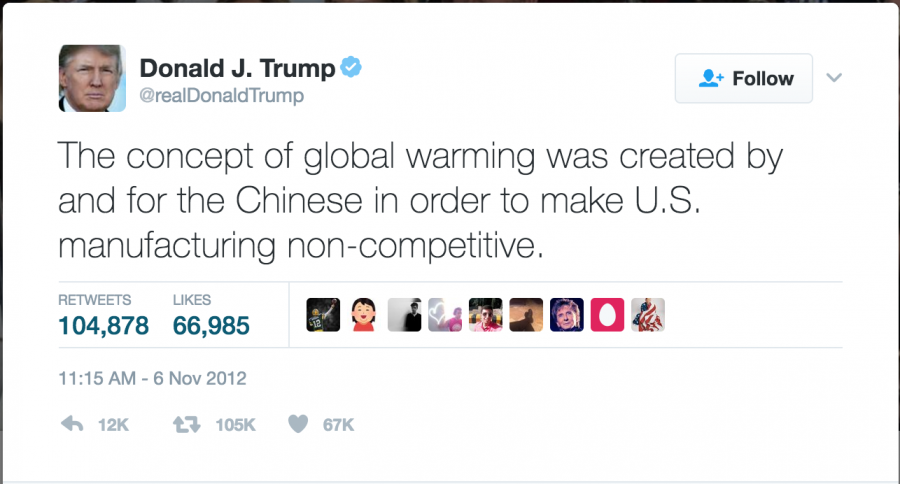Climate change in the Trump presidency
February 28, 2017
The day of President Donald J. Trump’s inauguration, all references to climate change initiatives were scrubbed from the White House website. Since then, environmental conservation has not been addressed, and the future of climate change under Trump remains unclear.
In January 2014, Trump tweeted that climate change was “an expensive hoax” and has stood by this initial opinion throughout his presidential campaign.
The United Nations Intergovernmental Panel on Climate Change stated in its 2013 report that there was a 95 percent chance that human activity is the main cause of climate change. However, 51 percent of all Americans believe that natural patterns are responsible to climate change or that there is not evidence for climate change, according to a survey conducted by the Pew Research Center during the summer of 2016.
“Americans are increasingly convinced global warming is happening and are more worried about it,” Anthony Leiserowitz, director of the Yale Project on Climate Change Communication, wrote in a Jan. 18 press statement. “This indicates that on this issue, there is a growing gap between the views of the American public and the incoming Trump administration.”
On Jan. 23, the United States Department of Agriculture (USDA) sent an internal memo to its employees stating that press releases and policy statements would be required to undergo review by the Office of Secretary prior to being published. Initially, many were concerned with the notion of potentially censoring scientists, but USDA deputy administrator Michael Young later explained that it is standard procedure and similar to a memo sent out when Barack Obama swore into office.
The United States Environmental Protection Agency (EPA) was also affected by Trump’s inauguration, with its grants and contracts frozen for a week as it underwent review. Obama often turned to the EPA to bring forth several initiatives regarding climate concerns that Congress decided to forgo, including the Clean Power Rule, a policy aimed at combating global warming through modified power plants, and the Water Rule, regarding management of water sources and pollution. However, Trump’s administration will have a different relationship with the EPA. With Trump’s nomination of Oklahoma attorney general Scott Pruitt as the EPA head, some fear that the Trump administration will potentially reallocate the EPA’s funding because Pruitt has previously sued the EPA.
“I think there are a lot of issues because all the members of the cabinet he is choosing are thinking the same way, which makes it very difficult to get things done,” AP Environmental Science teacher and Green Team advisor Jeff Sutton said. “The things that are getting done are facing very little opposition to make [Trump] think about how [matters] might play out long term. Scott Pruitt fits that suit. He is in agreement with lots of things that the rest of Trump’s cabinet is going to support.”
Anti-environmentalist Myron Ebell, who headed the transition team for the EPA, has made it known that Trump plans to pull out of the Paris Agreement, an United Nations agreement over cutting down greenhouse gas emissions, much to the dismay of American and European environmentalists.
Another incident over climate change since Trump’s inauguration was an unofficial Twitter account of the Badlands National Park posted about climate change on Jan. 24 in protest of Trump’s dismissal of climate change concerns and gag orders on federal environmental agencies. The tweets were soon deleted, and the National Park Service said that the tweets had been by a former employee. Since then, the park’s Twitter account has returned to posting photos and other park-related text.
Last month, Senate Republicans confirmed Pruitt’s nomination, and is now awaiting approval from the full Senate. After the election, Trump pulled back on his comments during his presidential run and said that he will look more into how he will confront the topic of climate change. Only a month into Trump’s presidency, it is still unclear what actions he will take towards energy regulation and climate change.
Two weeks ago, a group of Republicans led by former Secretaries and Secretaries of the Treasury, which calls itself the Climate Leadership Council, planned to impose a tax on emissions released by the burning of fossil fuels. They proposed this solution as a conservative one that takes a free market approach to improving the state of our planet and will speak to White House representatives about this initiative.
This piece was originally published in the pages of The Winged Post on February 21, 2017.


















![“[Building nerf blasters] became this outlet of creativity for me that hasn't been matched by anything else. The process [of] making a build complete to your desire is such a painstakingly difficult process, but I've had to learn from [the skills needed from] soldering to proper painting. There's so many different options for everything, if you think about it, it exists. The best part is [that] if it doesn't exist, you can build it yourself," Ishaan Parate said.](https://harkeraquila.com/wp-content/uploads/2022/08/DSC_8149-900x604.jpg)




![“When I came into high school, I was ready to be a follower. But DECA was a game changer for me. It helped me overcome my fear of public speaking, and it's played such a major role in who I've become today. To be able to successfully lead a chapter of 150 students, an officer team and be one of the upperclassmen I once really admired is something I'm [really] proud of,” Anvitha Tummala ('21) said.](https://harkeraquila.com/wp-content/uploads/2021/07/Screen-Shot-2021-07-25-at-9.50.05-AM-900x594.png)







![“I think getting up in the morning and having a sense of purpose [is exciting]. I think without a certain amount of drive, life is kind of obsolete and mundane, and I think having that every single day is what makes each day unique and kind of makes life exciting,” Neymika Jain (12) said.](https://harkeraquila.com/wp-content/uploads/2017/06/Screen-Shot-2017-06-03-at-4.54.16-PM.png)








![“My slogan is ‘slow feet, don’t eat, and I’m hungry.’ You need to run fast to get where you are–you aren't going to get those championships if you aren't fast,” Angel Cervantes (12) said. “I want to do well in school on my tests and in track and win championships for my team. I live by that, [and] I can do that anywhere: in the classroom or on the field.”](https://harkeraquila.com/wp-content/uploads/2018/06/DSC5146-900x601.jpg)
![“[Volleyball has] taught me how to fall correctly, and another thing it taught is that you don’t have to be the best at something to be good at it. If you just hit the ball in a smart way, then it still scores points and you’re good at it. You could be a background player and still make a much bigger impact on the team than you would think,” Anya Gert (’20) said.](https://harkeraquila.com/wp-content/uploads/2020/06/AnnaGert_JinTuan_HoHPhotoEdited-600x900.jpeg)

![“I'm not nearly there yet, but [my confidence has] definitely been getting better since I was pretty shy and timid coming into Harker my freshman year. I know that there's a lot of people that are really confident in what they do, and I really admire them. Everyone's so driven and that has really pushed me to kind of try to find my own place in high school and be more confident,” Alyssa Huang (’20) said.](https://harkeraquila.com/wp-content/uploads/2020/06/AlyssaHuang_EmilyChen_HoHPhoto-900x749.jpeg)







